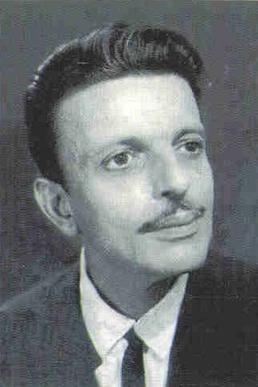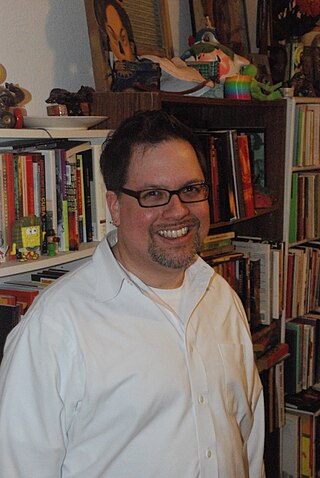
The Nuyorican movement is a cultural and intellectual movement involving poets, writers, musicians and artists who are Puerto Rican or of Puerto Rican descent, who live in or near New York City, and either call themselves or are known as Nuyoricans. It originated in the late 1960s and early 1970s in neighborhoods such as Loisaida, East Harlem, Williamsburg, and the South Bronx as a means to validate Puerto Rican experience in the United States, particularly for poor and working-class people who suffered from marginalization, ostracism, and discrimination.

René Marqués was a Puerto Rican short story writer and playwright.

Puerto Rican literature is the body of literature produced by writers of Puerto Rican descent. It evolved from the art of oral storytelling. Written works by the indigenous inhabitants of Puerto Rico were originally prohibited and repressed by the Spanish colonial government.
Caridad de la Luz, a.k.a. "La Bruja", is a Nuyorican poet, playwright, actress and activist. She is considered one of the leading spoken word poets in the world. In 2005, El Diario La Prensa, the largest Spanish-language newspaper in New York City, named De la Luz as one of the "Fifty Most Distinguished Latinas in the United States".
Arthur Avilés is an American Bessie Award-winning dancer and choreographer of Puerto Rican descent. Avilés was born in Queens, New York, and raised in Long Island and the Bronx. He graduated from Bard College, a liberal arts college in Annandale-on-Hudson, New York. After graduating from Bard, he became a member of the Bill T. Jones/Arnie Zane Dance Company, and toured internationally with the company for eight years 1987 to 1995.

Lawrence La Fountain-Stokes is a gay Puerto Rican author, scholar, and performer. He is better known as Larry La Fountain. He has received several awards for his creative writing and scholarship as well as for his work with Latino and lesbian, gay, bisexual, and transgender (LGBTQ) students. He currently resides in Ann Arbor, Michigan.

Francisco Arriví, a.k.a. Paco, was a writer, poet and playwright known as "The Father of the Puerto Rican Theater."

Manuel Ramos Otero was a Puerto Rican writer. He is widely considered to be the most important openly gay twentieth-century Puerto Rican writer who wrote in Spanish, and his work was often controversial due to its sexual and political content. Ramos Otero died in San Juan, Puerto Rico, due to complications from AIDS.
Elizabeth Marrero is an American of performance artist, comedian, and drag king who is best known as Macha, the "papi chulo drag king", a character she created in 1999. Her solo and collaborative work is characterized by her open exploration of lesbian and Puerto Rican issues in a working-class or ghetto environment and by her links to stand-up comedy. She was born and lives in the Bronx, New York.

The Teatro Puerto Rico was a music hall focused on the Latino community in the Mott Haven neighborhood of the South Bronx in New York City. During the 1940s to 1950s it presented la farándula, a vaudeville-style package of Spanish-language events, and attracted entertainers from all over Latin America. In the late 1960s, the neighborhood where the theater was located was in decline and the theater closed its doors until 1994. That year a real estate developer invested funds in renovations. After two years in operation, a political scandal involving misappropriated public funds forced the permanent closure of the theater. The building which the theater once occupied is now used as a place of religious worship.
Aravind Enrique Adyanthaya is a Puerto Rican writer, performer, and theater director. He is the founding artistic director of Casa Cruz de la Luna, an experimental theater company and cultural center established in 1998 that was based in a former residence and commercial space in the historical district of San Germán, Puerto Rico until 2022. Through Casa Cruz de la Luna, he has directed innovative productions of works by Federico García Lorca, Miguel de Cervantes, and Puerto Rican writer Pepe Liboy.
INTAR Theatre, founded in 1966, is one of the oldest Hispanic theater companies in the United States. The INTAR acronym is for International Arts Relations.

Migdalia Cruz is a writer of plays, musical theatre and opera in the U.S. and has been translated into Spanish, French, Arabic, Greek, and Turkish.
Cándido Tirado is a Puerto Rican playwright who moved to the Bronx from Caguas, Puerto Rico at age 11. Tirado is currently a resident playwright for Teatro Vista in New York City. In the United States his works have been produced by theater companies such as Teatro Vista, Puerto Rican Traveling Theatre, and the Goodman Theatre. His works have also been produced outside of the United States, in places such as the Dominican Republic and the Canary Islands. Tirado has taken part in directing and writing for INTAR theater's annual one-minute play festival.
The Puerto Rican Traveling Theater is a theater company based at the 47th Street Theater in New York City. It was founded as El Nuevo Círculo Dramatico by Míriam Colón and Roberto Rodríguez.
Rosalba Rolón is a Puerto Rican actress and director, who is known for being the founder and current artistic director of the Pregones Theater Company, a Bronx-based touring company that focuses on Latinx stories.
Jorge Alfonso Huerta is a Chicano scholar, author, and theater director. He specializes in Chicano and United States Latinx Theatre. He has written and edited several books specializing in Chicano theatre and is considered to be an authoritative expert in his field.
Dean Zayas Pereira was a Puerto Rican actor, director, playwright, author, poet, dramatic arts professor, and television show host. He directed some of Puerto Rico's best known telenovelas, such as Cristina Bazán, Coralito and Tanairi among others. Zayas was a catedràtic at the University of Puerto Rico, Rio Piedras Campus, for over 50 years.








